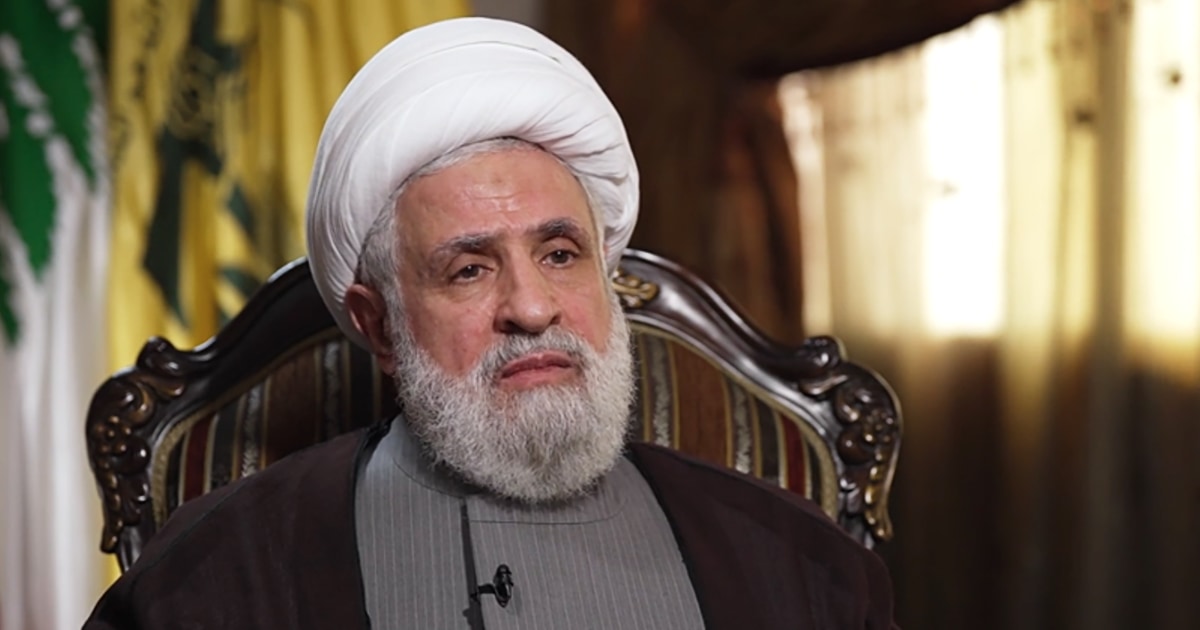By Matt Bradley, Ziad Jaber and Natasha Lebedeva -
NBC News
The Hezbollah group, backed by Iran, is determined not to escalate the clashes it has had for months on Lebanon's southern border, but will respond in the same way to any Israeli escalation, declared the second in command of the political party and militia to our sister network NBC News in a rare, exclusive interview.
Naim Qassem blamed Israel and the United States for perpetuating “tit-for-tat” attacks that have claimed the lives of hundreds of people in southern Lebanon and displaced tens of thousands of civilians on both sides of the Israeli-Lebanese border. The conflict began with the Hamas terrorist attack on Israel on October 7, which killed more than 1,200 people and triggered the bloody Israeli incursion into the Gaza Strip, in which nearly 34,000 people have since been killed, according to the Ministry of Health in Gaza, which is governed by Hamas.
“
We didn't expect the war to last this long
because we didn't think Netanyahu was so foolish, nor did Biden and the other countries,” Qassem declared, as the two-front Israeli conflict drags into its seventh month.
As Hezbollah's deputy secretary general, Qassem is second only to the group's leader, Hassan Nasrallah.
Qassem's comments came as Israel prepares its response to a barrage of Iranian missiles and drones that were launched in an unprecedented retaliation against the Jewish state. An action by Israel would bring the Middle East closer to a general war in the region than at any other time in recent history.
But the latest round of fighting between Israel and Hezbollah began months before last weekend's direct confrontation between Israel and Iran. It is estimated that Hezbollah has more than 150,000 rockets and missiles, in addition to drones and anti-tank, anti-aircraft and anti-ship missiles, according to a report by the Reuters agency that cites CIA data.
Hezbollah, a
powerful Iranian-backed Shiite political party and militant organization
, was formed in the early 1980s during the Lebanese civil war and became an active force during the Israeli occupation of southern Lebanon, when it made it its mission to expel to the Israeli forces in the country. The group has long claimed its solidarity with the Palestinian cause. The United States considers Hezbollah a terrorist organization.
The organization first attacked a disputed border region in northern Israel on October 8, the day after Hamas' attack on Israel. At the time, Hezbollah called this attack an act of “solidarity” with Hamas. Iran has also supported Hamas for years.
The group on Wednesday claimed responsibility for a missile and drone attack on northern Israel that wounded 18 people, 14 of them Israeli soldiers, and said the attacks were retaliation because Israel had killed two commanders. of the group in a cross-border attack the previous day.
Among the many Iranian-backed groups opposing Israel in the Middle East, Hezbollah is by far the strongest and the one that benefits the most from Iranian largesse.
Iran has declared that its attack on Saturday night, in which it launched more than 300 missiles and drones at Israel, marked the end of its retaliation for the April 1 Israeli attack on the Iranian consulate in Damascus, capital of Syria, in which two senior commanders and five advisers of Iran's Islamic Revolutionary Guard Corps were killed.
Qassem claimed that Iran confirmed his public messages to Hezbollah.
“Tehran speaks publicly and clearly.
They do not want war, they have responded to the attack on their embassy and that is it
,” Qassem commented. “I think Iran is honest. This is what they have told us and this is what they continue to reiterate to the media.”
Qassem was mildly critical of the three Arab countries – Jordan, Saudi Arabia and the United Arab Emirates – that collaborated in Israel's defense against the Iranian barrage on Saturday night.
“It was not appropriate for any Arab nation to support Israel, no matter what justifications they had,” he said. “Their populations will hold accountable all those who made this decision.”
Qassem blamed Israel and the United States equally for the civilian losses in Gaza, and dismissed a recent public disagreement between US President Joe Biden and Israeli Prime Minister Benjamin Netanyahu as little more than cosmetic politics aimed at “safeguarding the image of the United States.”
“I consider that both Biden and Netanyahu are complicit in the same plan with very small differences,” Qassem said.
In a previous interview in November, Qassem told NBC News that Hezbollah would push its fight against Israel even harder if the Jewish state continued its incursion into Gaza.
But nearly six months later, both Hezbollah and Israel
have largely stuck to the “rules of engagement
,” a tacit agreement between both sides that has so far moderated the fighting and limited it to the border regions of the two countries. .
“We will not accept that the Israelis transgress the rules of engagement currently established in the south” of Lebanon, he declared. “If the Israelis increase their attacks, we will also increase ours.”
Although Israel is sticking to the rules of engagement for now, senior Israeli officials have threatened to destroy Lebanon if Hezbollah intensifies its attacks.
In January, Israel was believed to have killed a Hamas leader in Beirut in a drone strike, raising tensions, although Israel did not claim responsibility.
Despite its limited involvement, Qassem asserted that Hezbollah's fight is "serving its purpose" by "drawing Israeli forces to deal with the north," referring to the border they share, rather than Gaza, which borders with southern Israel.
“Therefore, we will continue to do so, and
we will not fight a full-scale war unless the Israelis decide to go to war against us
,” he stated. “Then we will be prepared for full confrontation.”

